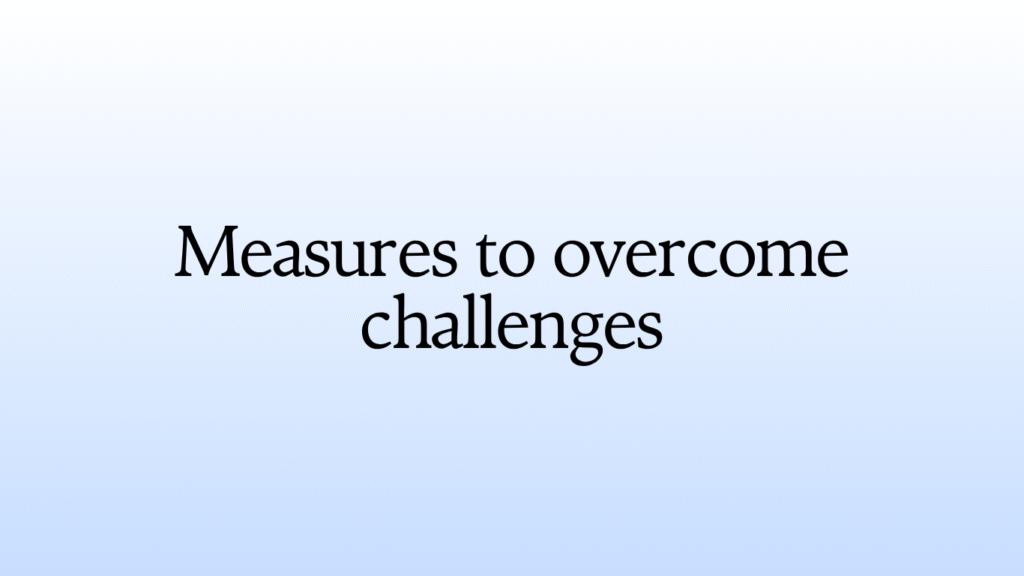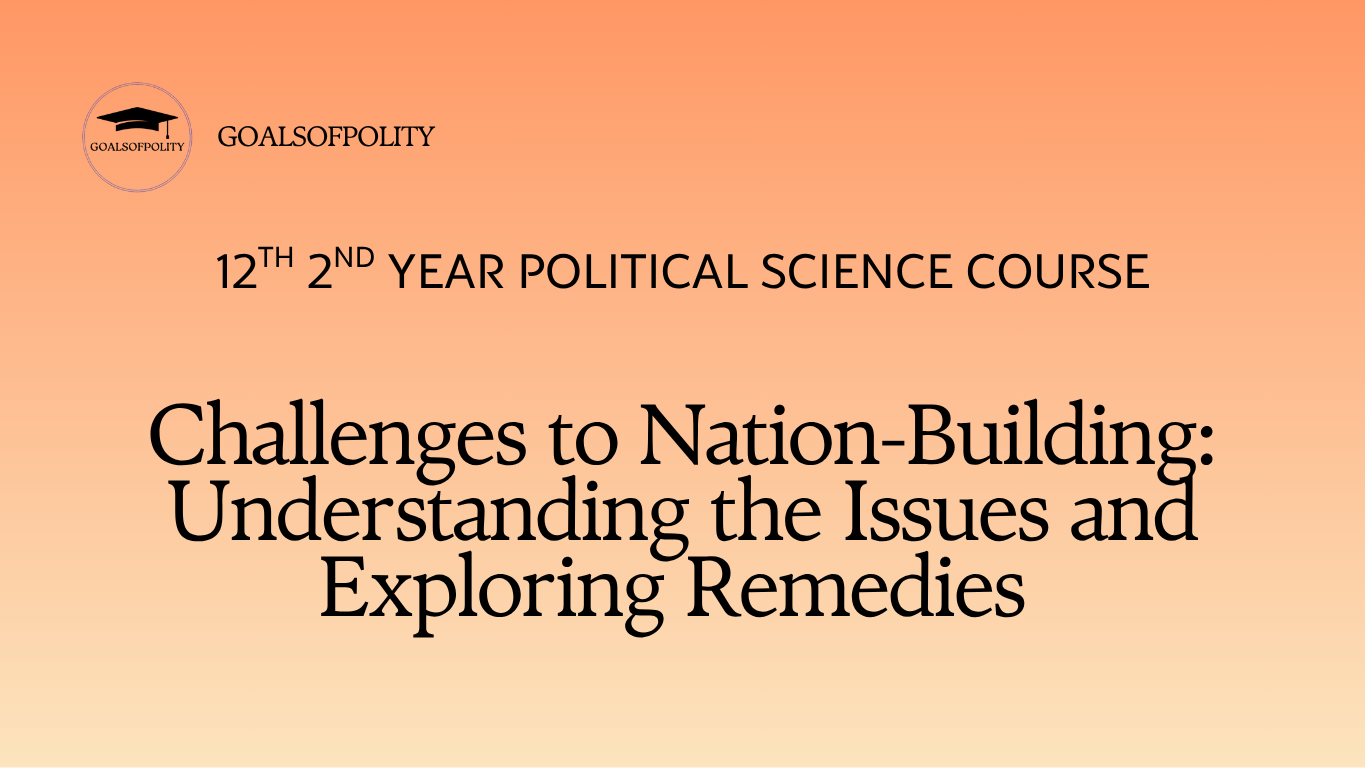Table of Contents
Uniting a nation’s population under a single national identity is the aim of the complex process of nation-building. It entails the growth of political institutions, the encouragement of social cohesiveness, and the development of national unity. This process is challenging, especially for nations with large and diverse populations. It will explore the meaning of nation-building, its significance, and the various challenges it faces, including communalism, casteism, regionalism, and terrorism. It will also talk about potential solutions to these problems.
Meaning of Nation Building:
The endeavors of a nation to create a national identity that binds its people together are referred to as nation-building. This process involves:
- Political integration: Establishing stable and effective political institutions that represent the entire population.
- Economic development: Ensuring equitable economic growth that benefits all regions and communities.
- Social cohesion: Encouraging a feeling of solidarity and belonging among the nation’s many groups.
- Cultural integration: Promoting shared culture and values while respecting cultural diversity.
The ultimate goal of nation-building is to create a stable, prosperous, and United States, where all citizens feel included and invested in the country’s future.
Challenges of Nation Building:
1. Communalism:
Communalism is the term used to describe how society is divided along religious lines, which causes tension and conflict between various religious groups. This challenge undermines nation-building by fostering mistrust and hostility among citizens. Violence, social unrest, and a loss of sense of national cohesion are all consequences of communalism.
2. Casteism:
Casteism, especially in countries like India, refers to the hierarchical division of society based on caste. This deep-rooted structure of social stratification leads to discrimination and social exclusion of particular groups, consequently hampering efforts to achieve social equality and coherence. Caste-based discrimination can impede economic development and political participation, further hindering nation-building.
3. Regionalism:
Regionalism involves prioritizing regional interests over national interests. This can lead to conflict between different regions, as each seeks greater autonomy or resources at the expense of national harmony. Political instability and fragmentation may result from regionalism, which can be fueled by historical grudges, cultural divisions, or economic disparities.
4. Terrorism:
Terrorism poses a significant threat to nation-building by destabilizing society, undermining trust in government institutions, and creating a climate of fear and insecurity. Terrorist activities can impede economic development, affect social cohesion, and provoke harsh government responses that may further alienate certain groups.
Measures to overcome challenges:

5. Promoting inclusive growth:
Fighting regionalism, casteism, and communalism requires fostering inclusive economic and social growth. Policies should aim to reduce inequalities, ensure fair distribution of resources, and provide equal opportunities for all citizens. Special attention should be paid to marginalized communities to raise their socio-economic status.
6. Strengthening democratic institutions:
Strong democratic institutions that ensure the representation and participation of all sections of society are crucial for nation-building. Electoral reforms, transparency, and accountability in governance can help build trust in political systems and reduce feelings of exclusion and marginalization.
7. Promoting national identity:
Promoting a common national identity that transcends regional, caste, and religious divides is crucial. The educational curriculum should emphasize national history, values, and symbols that unite citizens. Cultural exchange programs and national celebrations can also strengthen the sense of unity.
8. Combatting terrorism with comprehensive strategies:
A comprehensive approach to combating terrorism should combine security measures with initiatives to address underlying causes such as poverty, lack of education, and political deprivation. Community engagement and deradicalization programs can help prevent the spread of extremist ideologies.
9. Encouraging interreligious and inter-caste dialogue:
Dialogue and interaction between different religious and caste groups can help break stereotypes and build mutual understanding. Community leaders and civil society organizations play an important role in facilitating these conversations and promoting social harmony.
10. Transfer of power:
To address regionalism, a balanced transfer of power can ensure that regional interests are respected while maintaining national harmony. Federal arrangements that allow regional autonomy within a unified framework can help manage regional aspirations and prevent conflicts.
Conclusion:
Nation-building is a complex and ongoing process that requires concerted efforts to overcome various challenges. By addressing issues similar to communalism, casteism, regionalism, and terrorism through inclusive growth, democratic consolidation, and the development of a shared national identity, nations can build robust and unified countries. It is only through these combined efforts that the dream of a unified, prosperous, and harmonious nation can be realized.
FAQs:
Q1. What are the major challenges to nation-building in a diverse country like India?
The major challenges include:
A. Cultural and linguistic diversity
B. Regionalism and secessionist movements
C. Communalism and religious conflicts
D. Caste-based discrimination
E. Economic disparities
F. Political instability
G. Terrorism and insurgency
Q2. Why is linguistic diversity a challenge to nation-building?
Linguistic diversity can lead to demands for separate states or special status, creating friction and weakening national integration if not managed properly. Language has the power to both unite and divide.
Q3. How do regionalism and separatist movements affect nation-building?
Regionalism promotes loyalty to one’s region over the nation, often leading to demands for autonomy or even secession, which directly threatens the unity and integrity of the country.
Q4. What role does communalism play in undermining nation-building?
Communalism fosters divisions based on religion, often leading to communal riots, mistrust among communities, and a threat to secularism—an essential component of a united nation.
Q5. How does caste-based discrimination hinder nation-building?
Caste discrimination leads to social inequality and marginalization of large sections of the population, which creates resentment and divides society instead of uniting it under a common national identity.
Q6. What are some effective remedies to the challenges of nation-building?
Some key remedies include:
A. Promoting inclusive development
B. Strengthening democratic institutions
C. Emphasizing secular and liberal education
D. Implementing affirmative action
E. Encouraging national integration programs
F. Ensuring equal representation of all communities
Q7. How does education contribute to nation-building?
Nation-building requires the promotion of civic ideals, national identity, tolerance, awareness of rights and responsibilities, and a sense of unity among citizens, all of which are aided by education.
Q8. What is the role of the Indian Constitution in nation-building?
The Indian Constitution provides a common legal and moral framework for all citizens. It guarantees fundamental rights, ensures justice, and lays down the principles of democracy, secularism, and equality—all essential for nation-building.
Q9. Can federalism support nation-building in India?
Yes, cooperative federalism can support nation-building by giving states autonomy while maintaining unity through a strong central framework. It ensures regional aspirations are respected within the national interest.
Q10. What part do youths play in the development of a country?
Youth play a vital role by participating in civic life, promoting innovation, bridging communal divides, and upholding democratic and secular values necessary for a strong, united nation.

